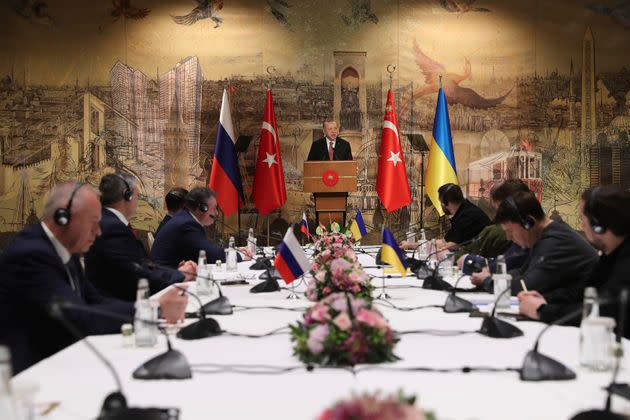Here's What You Need To Know About The Russia-Ukraine Peace Talks
The Russia-Ukraine peace talks are gaining momentum, as Russia said Tuesday it would scale back its operations in the cities of Kyiv and Chernihiv to “increase trust” in the negotiations, as delegations for both sides wrapped up for the day in Istanbul, Turkey.
Russia’s Deputy Defense Minister Alexander Fomin said the announcement is intended “to create conditions for further negotiations,” according to The Associated Press.
The country has also now floated the possibility of a meeting between Russian President Vladimir Putin and Ukrainian President Volodymyr Zelenskyy, CNN reported.
“If that was to be the case, it is another major concession to President Zelenskyy who has asked from the very beginning, even before the invasion, to have face-to-face talks with President Putin,” CNN’s Christiane Amanpour said.
Any ceasefire can’t come soon enough for Ukrainian civilians, who have borne the brunt of Russia’s frustrated and stalled land offensive. pic.twitter.com/RuBXSjv8V7
— Christiane Amanpour (@amanpour) March 29, 2022
Turkish President Recep Tayyip Erdogan, whose country hosted Tuesday’s talks, called on both sides to end the war.
“Prolonging the conflict is not in anyone’s interest,” Erdogan said.

What Does Russia Want Out Of The Peace Talks?
Putin explained the reasons behind the war he described as a “special military operation” in Ukraine during a televised address to the Russian people on Feb. 24.
“The purpose of this operation is to protect people who, for eight years now, have been facing humiliation and genocide perpetrated by the Kyiv regime,” Putin said, according to an English translation of the speech by Bloomberg. “To this end, we will seek to demilitarize and denazify Ukraine.”
The Kremlin has also wanted Russian to be the official second language in Ukraine.
While the Financial Times reported Monday that those demands were not in the draft agreement prepared as part of the peace talks, Russia is still asking for Ukraine to stay out of the NATO alliance.
Besides, Moscow is continuing to argue for Crimea — which it annexed in 2014 — and Luhansk and Donetsk — two territories held by Russian-backed separatists in the eastern region of Donbas — to be officially recognized as Russian.
On Crimea, Ukrainian negotiators said Tuesday they could continue holding talks over a 15-year period, assuming both countries held off from using armed forces to address the issue.
Zelenskyy said Sunday he wants a “compromise” in Donbas, according to Reuters, while Russia’s defense minister told military officials Tuesday the country had nearly completed the initial phase of its operation and was now turning its attention to the “main goal — the liberation of Donbas,” according to AP.
What Does Ukraine Want Out Of The Peace Talks?
Ukraine is asking for a cease-fire, security guarantees and that its sovereignty and territorial integrity stay intact, according to the BBC.
While Ukraine has ruled out joining NATO, it still applied to join the European Union, something that Russia said it is open to allowing, according to the Financial Times.
“Regarding NATO, I have cooled down regarding this question long ago after we understood that NATO is not prepared to accept Ukraine,” Zelenskyy told ABC News on March 8, according to Insider.
Zelenskyy confirmed he is open to neutrality in Ukraine, which would also mean the country would have to remain impartial in any future conflicts and no foreign military bases would be allowed on its territory.
“Security guarantees and neutrality, non-nuclear status of our state. We are ready to go for it,” Zelenskyy told Russian journalists Sunday, according to an English translation provided by Reuters.
All other countries in Europe that are considered neutral, including Austria, Finland and Ireland, continue to have their own militaries to be able to fight back in case they are attacked, according to Vox.
Still, Zelenskyy added that a cease-fire agreement would have to be reached before any deal, including a neutrality commitment, goes to a referendum.
A “referendum is impossible when there is the presence of troops,” he said.
Ukraine has also sought security guarantees from countries including Russia, the U.S., Germany and China, David Arakhamia, head of Zelenskyy’s party in Parliament and a member of Ukraine’s negotiating team, told the Financial Times. Those guarantees would work similarly to NATO’s Article 5 clause where countries are committed to support a member being attacked, Arakhamia explained.
Is A Breakthrough Actually Possible?
Even as Russia has signaled it is prepared to walk back some of its initial demands and deescalated part of its offensive, the West and Ukraine are not confident an imminent breakthrough is possible.
U.S. President Joe Biden is holding talks over the phone with the leaders of France, Germany, Italy and the U.K. to discuss the latest developments, according to the BBC.
“Everything I have seen is [Putin] is not willing to compromise at this point,” an anonymous senior U.S. State Department official told Reuters Monday.
Mykhailo Podolyak, a senior aide to Zelenskyy, told ABC News on Thursday that even though there was genuine engagement from Russia in the peace talks, it could still be months before any conclusion is reached.
“They’re absolutely real negotiations,” Podolyak said. “There’s no attempt to stall for time. That’s definitely not there.”
Previous talks held by delegations for the two countries in Belarus and virtually have failed to yield results.
This article originally appeared on HuffPost and has been updated.

